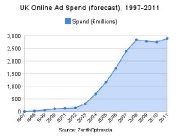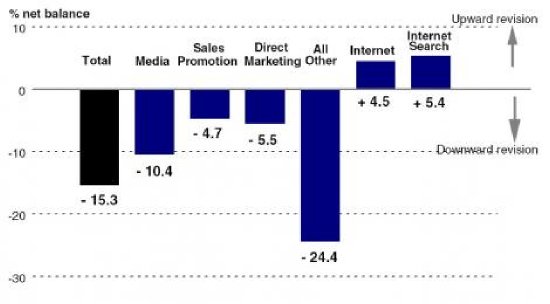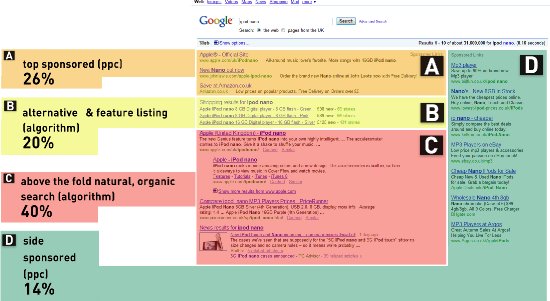Online advertising now the strongest route to market
New figures from the Internet Advertising Bureau show that online ad spend has overtaken TV in the UK. Britain is the first mature market in which this significant change has happened and it shows that companies here appreciate that web advertising is now the best route to market.
In the, first six months of 2009, 23.5% of all ad spend in the UK was taken by online forms compared with just 21.9% for TV.
In this the UK is ahead of the curve. To date, the world's other major markets have not matched the UK's milestone. In the US, online ads make up 15.4% of the total market and still trail TV. Asia-Pacific has even more ground to make up with a percentage only just in double digits while TV commands over 30%. Globally, the web advertising figure stands at 13.2% .
Redrawing the balance
In difficult economic times, online advertising forms are the only growth sectors. The graph below shows that all offline forms of advertising are decreasing while 'Internet' and 'Internet Search (PPC)' are the two areas witnessing an increase.
IPA Bellwether report
Marketing departments have come to appreciate that online advertising is more engaging and versatile, which translates to a better return on investment.
It is more attractive than traditional advertising channels because it is more accessible. TV remains the domain of firms with large budgets and the small players simply cannot afford to compete in this advertising arena.
Online is a different proposition, however. Basic costs are lower and with sophisticated targeting, budgets can be focused. Furthermore, pay per click, an 'Internet only' advertising form, offers advertisers the benefit of only incurring cost when people click on their ads.
"Crucially, this allows small and medium size businesses to compete with their bigger rivals," states Lawrence Jones, MD of successful hosting business UKFast.
Jones continues, "This is exactly the experience of UKFast. We have enjoyed tremendous growth at the expense of larger competitors, despite having a much more modest advertising budget."
Getting the balance right
So the statistics show that advertisers are increasingly looking to the Internet, but that means competition is growing when overall budgets are actually shrinking.
Research from the Advertising Association reveals that online ad spend increased by a huge 19.1 per cent in 2008, maintaining a dramatic increase since 2003.
However the data depicted below from Zenith Optimedia shows that even online spend is predicted to dip over the next couple of years as the effects of the recession continue to play a part.
All businesses wish they could spend less on PPC and still maintain their rankings. UKFast believes that speed is the key to reducing PPC costs.
To retain user numbers, search engines want to deliver an excellent service. Users say they want speed, so the search engines give fast loading websites preferential rankings.
This therefore means that high rankings can be achieved through a modest investment in speed instead of a heavy investment in PPC.
Online travel business Let's Stay UK is a good example of the effect speed has. The business does not engage in 'pay per click' campaigns and yet it regularly features in the top three of search returns on its key terms. This includes consistently beating much bigger rivals such as Haven and Butlins.
However, according to Google research into user habits, traditional organic results only capture 40% of users. 20% are taken by organic forms that use other Google media, such as shopping and news links, while the remaining 40% are focused on the Pay Per Click (PPC) results. So to get a rounded search engine campaign involves ranking highly in multiple organic and PPC sections.
Consider the diagram below. The red section is the traditional organic returns and it commands 40% of users' attention. The yellow section contains, in this example, Google shopping links and draws 20%. The orange section is the top paid results and it gains 26% of users, while the green section is the remainder of the paid links and that only draws 14% .
The importance of the yellow section is worth noting. While it is made up of free organic links like the red section, it is a separate section in terms of the algorithm that generates it. What this means for companies trying to achieve high organic rankings is that they must meet the requirements of both algorithms.
Meanwhile, to rank highly in the paid areas it is clearly vital to get into the orange section. Here three links share 26% of the clicks, as opposed to the right column sponsored links, which share 14% between 7 results.
Speed also helps to deliver higher PPC rankings because of Google's desire to provide an excellent user experience across the board. The time it takes for the user to load your webpage is assessed and added to the 'Quality Score' that determines the cost of the PPC. This allows Google to reward websites that look to deliver a better service.
This means that speed can reduce your PPC costs in relation to your competitors. You can rank more highly than they do and pay less for the privilege!
"The most effective advertising today is online," adds Jones. "But with budgets limited and competition tough online businesses need other cost-effective ways to achieve prominence in the search rankings."
Jones concludes, "Speed is one answer. Fast hosting delivers higher rankings in both organic and paid search. It can be the factor that makes an online business take-off."
In the, first six months of 2009, 23.5% of all ad spend in the UK was taken by online forms compared with just 21.9% for TV.
In this the UK is ahead of the curve. To date, the world's other major markets have not matched the UK's milestone. In the US, online ads make up 15.4% of the total market and still trail TV. Asia-Pacific has even more ground to make up with a percentage only just in double digits while TV commands over 30%. Globally, the web advertising figure stands at 13.2% .
Redrawing the balance
In difficult economic times, online advertising forms are the only growth sectors. The graph below shows that all offline forms of advertising are decreasing while 'Internet' and 'Internet Search (PPC)' are the two areas witnessing an increase.
IPA Bellwether report
Marketing departments have come to appreciate that online advertising is more engaging and versatile, which translates to a better return on investment.
It is more attractive than traditional advertising channels because it is more accessible. TV remains the domain of firms with large budgets and the small players simply cannot afford to compete in this advertising arena.
Online is a different proposition, however. Basic costs are lower and with sophisticated targeting, budgets can be focused. Furthermore, pay per click, an 'Internet only' advertising form, offers advertisers the benefit of only incurring cost when people click on their ads.
"Crucially, this allows small and medium size businesses to compete with their bigger rivals," states Lawrence Jones, MD of successful hosting business UKFast.
Jones continues, "This is exactly the experience of UKFast. We have enjoyed tremendous growth at the expense of larger competitors, despite having a much more modest advertising budget."
Getting the balance right
So the statistics show that advertisers are increasingly looking to the Internet, but that means competition is growing when overall budgets are actually shrinking.
Research from the Advertising Association reveals that online ad spend increased by a huge 19.1 per cent in 2008, maintaining a dramatic increase since 2003.
However the data depicted below from Zenith Optimedia shows that even online spend is predicted to dip over the next couple of years as the effects of the recession continue to play a part.
All businesses wish they could spend less on PPC and still maintain their rankings. UKFast believes that speed is the key to reducing PPC costs.
To retain user numbers, search engines want to deliver an excellent service. Users say they want speed, so the search engines give fast loading websites preferential rankings.
This therefore means that high rankings can be achieved through a modest investment in speed instead of a heavy investment in PPC.
Online travel business Let's Stay UK is a good example of the effect speed has. The business does not engage in 'pay per click' campaigns and yet it regularly features in the top three of search returns on its key terms. This includes consistently beating much bigger rivals such as Haven and Butlins.
However, according to Google research into user habits, traditional organic results only capture 40% of users. 20% are taken by organic forms that use other Google media, such as shopping and news links, while the remaining 40% are focused on the Pay Per Click (PPC) results. So to get a rounded search engine campaign involves ranking highly in multiple organic and PPC sections.
Consider the diagram below. The red section is the traditional organic returns and it commands 40% of users' attention. The yellow section contains, in this example, Google shopping links and draws 20%. The orange section is the top paid results and it gains 26% of users, while the green section is the remainder of the paid links and that only draws 14% .
The importance of the yellow section is worth noting. While it is made up of free organic links like the red section, it is a separate section in terms of the algorithm that generates it. What this means for companies trying to achieve high organic rankings is that they must meet the requirements of both algorithms.
Meanwhile, to rank highly in the paid areas it is clearly vital to get into the orange section. Here three links share 26% of the clicks, as opposed to the right column sponsored links, which share 14% between 7 results.
Speed also helps to deliver higher PPC rankings because of Google's desire to provide an excellent user experience across the board. The time it takes for the user to load your webpage is assessed and added to the 'Quality Score' that determines the cost of the PPC. This allows Google to reward websites that look to deliver a better service.
This means that speed can reduce your PPC costs in relation to your competitors. You can rank more highly than they do and pay less for the privilege!
"The most effective advertising today is online," adds Jones. "But with budgets limited and competition tough online businesses need other cost-effective ways to achieve prominence in the search rankings."
Jones concludes, "Speed is one answer. Fast hosting delivers higher rankings in both organic and paid search. It can be the factor that makes an online business take-off."



































Your Opinions and Comments
Be the first to post a comment!